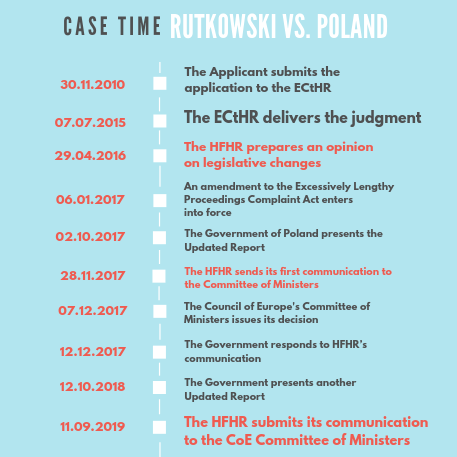
HFHR’s communication to Committee of Ministers: Poland fails to address lengthy proceedings
♦ The Helsinki Foundation for Human Rights has sent a communication to the Council of Europe’s Committee of Ministers referring to the execution of the European Court of Human Rights’ judgment issued in Rutkowski and Others v. Poland (application no. 72287/10).
♦ The case of Wiesław Rutkowski concerns the excessive length of court proceedings in a criminal matter. In Rutkowski, the ECtHR assessed whether the proceedings, which lasted 7 years and almost 10 months, could be considered excessively lengthy.
♦ In 2015, the Strasbourg Court found that Polish laws tackling protracted court proceedings were inconsistent with the European Convention on Human Rights. The HFHR has already sent a communication to the Council of Europe’s Committee of Ministers in the Rutkowski case.
ECtHR’s pilot judgment on the fragmentation of proceedings and insufficient compensation
In the Rutkowski judgment, the European Court of Human Rights found that Poland had violated Article 6 § 1 of the Convention on account of the unreasonable length of proceedings in the applicants’ cases and Article 13 of the Convention on account of the deficient operation of the complaint against the excessive length of proceedings, a remedy available under a law passed in 2004. The Court noted that the said violations of the Convention consisted in the unreasonable length of both civil and criminal proceedings and in the Polish courts’ non-compliance with the ECtHR case law setting criteria of the assessment of “the reasonableness of the length of proceedings” and “appropriate and sufficient redress” for a violation of the applicants’ right to have the case heard “within a reasonable time”. The ruling made in Rutkowski has the status of a “pilot judgment”. A pilot judgment is delivered in a situation where the Court notes that the volume of applications brought against a state is caused by the absence of appropriate national legislation, which leads to a large number of persons being affected.
A Strasbourg judgment is not the end
After a judgment is delivered by the European Court of Human Rights, the Council of Europe’s Committee of Ministers becomes responsible for supervising the judgment’s execution. Non-governmental organisations are in position to submit their communications to the Committee. The HFHR does this a regular basis so as to notify the Committee of Ministers of any actions taken on the national level after the judgment has been issued and to provide directions and recommendations for the domestic authorities.
HFHR: more changes needed
In its communication sent to the Committee of Ministers of the Council of Europe, the HFHR praised the solution adapted to address the issue of fragmentation of proceedings. Before the fragmentation problem was effectively tackled by the legislative amendments currently in force, the extensive length of proceedings was assessed only from the perspective of certain phases of proceedings rather than the entirety of a given case.
On the other hand, the Foundation’s communication criticises the applicable limits of just compensation for the excessive length of proceedings (PLN 20,000). The HFHR also noted that the minimum amount of money that may be awarded as just satisfaction for each year of excessively lengthy proceedings (PLN 500) still failed short of the standards set by the European Convention on Human Rights and the guidelines contained in the case law of the European Court of Human Rights. Moreover, the average amount of just compensation awarded by regional courts decreases on a yearly basis, whereas just compensation awarded by courts of appeal has increased significantly only in respect of certain types of proceedings (mainly criminal cases). The amount of compensation paid in other cases remains at the same, insufficient level or is even lower than the pre-amendment average.
The HFHR also underlined that the measures taken so far by the Polish Government have failed to sufficiently expedite court proceedings. The average duration of proceedings in Poland is – more or less – the same, but each year the courts receive more complaints against the excessive length of proceedings. For example, in 2018, regional courts and courts of appeal received 1,700 additional complaints as compared to 2016.
Case timeline
⇒ 30 November 2010: Mr Rutkowski’s application is lodged with the ECtHR
⇒ 7 July 2015: the ECtHR delivers the judgment.
The HFHR presents a review of the Rutkowski judgment (no. 9/2015), indicating excessive length as a structural problem
⇒ 29 April 2016: The HFHR prepares an opinion on legislative changes
⇒ 6 January 2017: An amendment to the Excessively Lengthy Proceedings Complaint Act enters into force
⇒ 2 October 2017: The Government of Poland presents the Updated Report
⇒ 28 November 2017: The HFHR sends its first communication to the Committee of Ministers
⇒ 7 December 2017: The Council of Europe’s Committee of Ministers issues its decision
⇒ 12 December 2017: The Government responds to HFHR’s communication.
⇒ 12 October 2018: The Government presents another Updated Report
⇒ 11 September 2019: The HFHR submits its communication to the CoE Committee of Ministers
Download:
Similar:
- HFHR’s report on pre-trial detention
- “A judgment in Strasbourg is not the end!” Report on the execution of judgement of the European Court of Human Rights
- HFHR’s communication to Council of Europe’s Committee of Ministers: Polish authorities are still failing to address lengthy pre-trial detention
- Has Poland fully executed ECtHR’s judgment on Chechen family’s detention? HFHR’s communication to CoE’s Committee of Ministers


18.09.2019
 Cookies EN
Cookies EN